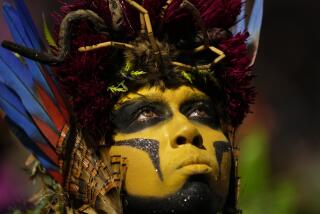Economic Woes Put Aside at Rio’s Annual Festival : Brazil Carnival Dedicated to Democracy
- Share via
RIO de JANEIRO — Brazil’s famous annual festival of pre-Lenten song, dance and debauchery is being called the Carnival of Democracy this year in celebration of the election of a civilian president after 21 years of military rule.
The political label for this year’s carnival is a tribute to Tancredo Neves, who takes office as president March 15. Neves, who will be 75 years old March 4, passed up an invitation to attend the festivities, but his advisers said that he is pleased with the upbeat carnival mood.
“Fortunately, no one is calling this the carnival of inflation. That would spoil the party,” said Otto Lara Resende, a newspaper columnist.
Difficult Economic Times
Economic times are hard in Brazil. Inflation increased prices 227% last year. Unemployment is high. Social workers contend that an increasing number of people who live in Rio’s shantytowns are going hungry, particularly children.
But for the four-day carnival period, hardships are put aside by participants from all walks of life. There is a willingness to accept the illusions created by the festival. There is an escape from the problems of reality.
For the last week, social clubs have been jammed for a succession of pre-carnival balls and parties, with entrance fees as high as $100 per person. In the shantytowns, samba schools have been rehearsing and putting the final touches on their entries for the competition between schools for the best musical allegory.
Samba Schools’ Parade
The high-point of the festival began Sunday night with a parade of the 16 top samba schools in the Sambadrome, a midway flanked by cement grandstands where 100,000 people, including many foreign tourists, gathered in 100-degree heat to watch the spectacle.
Only three of the 16 samba schools chose political themes for their allegories that can be related to current Brazilian concerns. There is no censorship now, so the choices reflect the preference of samba school members. The Sao Clemente school devoted its music and float display to housing problems. The Encima da Hora school presented the problems of victims of drought who have emigrated to the big cities. And Salguiero, one of the most famous schools, celebrated the memory of Getulio Vargas, who was twice president of Brazil and created the Labor Party.
All the rest of the schools chose themes that either were nostalgic celebrations of the past, including the abolition of slavery in 1889 by Emperor Pedro II, or futuristic fantasies, such as a “Carnival in the Stars,” complete with Martians dancing a samba march and a robot bull in the rings of Saturn.
“Carnival always creates an imaginary space for Utopias, but this is not a moveable feast that can be extended beyond this week,” wrote newspaper columnist Alfonso Romano de Santanna. “Whether this mood will extend beyond March 15 is an enigma.”
Cabinet to Be Named
Between the end of carnival Tuesday and inauguration day, President-elect Neves will have to announce a Cabinet formed on the basis of the complex political coalition that elected him president in the electoral college Jan. 15 as the opposition candidate.
Formation of the Cabinet requires definitions of policies to be followed in confronting inflation, refinancing Brazil’s $100-billion foreign debt, reactivating the economy to reduce unemployment and deciding on delicate issues such as agrarian reform, eliminating huge deficits among state enterprises and tax reform.
These are not the kinds of issues that form part of the carnival agenda.
More to Read
Sign up for Essential California
The most important California stories and recommendations in your inbox every morning.
You may occasionally receive promotional content from the Los Angeles Times.













